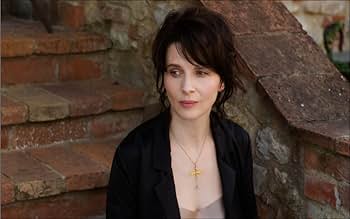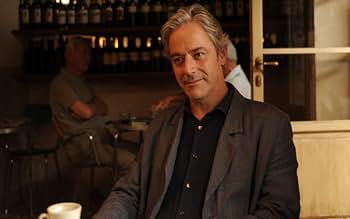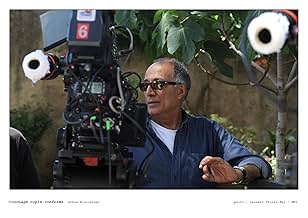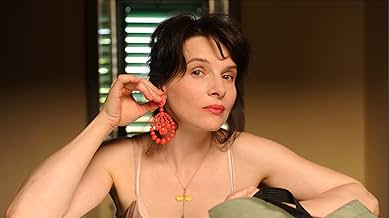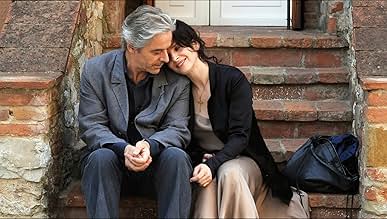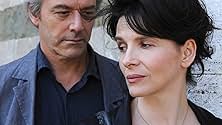Copie conforme
- 2010
- Tous publics
- 1h 46min
De passage en Toscane pour promouvoir son dernier livre, un écrivain britannique d'âge moyen rencontre une Française qui le conduit au village de Lucignano. Là-bas, une question fortuite rév... Tout lireDe passage en Toscane pour promouvoir son dernier livre, un écrivain britannique d'âge moyen rencontre une Française qui le conduit au village de Lucignano. Là-bas, une question fortuite révèle quelque chose de plus profond.De passage en Toscane pour promouvoir son dernier livre, un écrivain britannique d'âge moyen rencontre une Française qui le conduit au village de Lucignano. Là-bas, une question fortuite révèle quelque chose de plus profond.
- Réalisation
- Scénario
- Casting principal
- Récompenses
- 11 victoires et 29 nominations au total
- Le marié
- (as Filippo Troiano)
- La mariée
- (as Manuela Balsinelli)
Avis à la une
It has originality - it will not be like other films seen recently in mainstream European cinema, there is little or no plot, or action, rather we dealing with conversation, and the state of the heart and the mind in a fiercely non-Hollywood fashion. This is a film about thinking about emotions, and is almost non-linear in its conversations and if that concept doesn't appeal then it may well not be viewable.
It is, however, despite itself, pretty mesmerizing - what will they say next? what other aspect of why relationships fail and succeed will be tossed into the salad? who are they? why the games? etc;
The conversations are both alienating and intimate, and have a "play-acting" aspect that allows the psychosexual aspect of how we adults explore potentiality to be examined in a way that is normally reduced to sexual tension and flirting on film. This is a film that demands attention - this is not dumb film-making. I recognize the conversations and the feeling well, but in a sense the connection is too contrived to be really successful - but it certainly touches that part of intimacy that is normally, at best, ethereal.
The setting of Chianti and a beautiful hot summer day, with cicadas and a wonderful small town to explore, lightens this - but it remains a film for philosopher romantics. It is, as others here have noted in better ways than me, film as film - here there are images and shots that work to compliment the alienation and solipsistic nature of the two leads.
A film about questions that offers few answers, it is certainly intriguing and if you are into human exploration and condition worth the effort to watch.
He comes to her antique shop and invites her to drive around. However, she takes James to the village of Lucignano. While they are traveling, he autographs six books she had bought and they discuss the subject of his book. When they arrive in the village, they are mistakenly taken as husband and wife and the woman decides to play the game and soon the bitter James Miller assumes the role of her husband.
I am not a fan of Abbas Kiarostami, but I see his movies since they are usually challenging and open to interpretations. I have just seen "Copie Conforme" on DVD and I have my understanding of the story that may be or may be not the real intention of this Iranian writer / director.
Juliette Binoche's character definitely knows James Miller and there are evidences: first, she has a reserved spot in his lecture; then her son comments that she had decided to fall in love with the British writer; last, when James arrives in her antique shop, they do not introduce themselves to each other and they are not too formal as strangers certainly would be.
I believe that James Miller first met her years ago while she was walking on street with her son following her but never together. She probably would be a single mother with rejection to her son and on that occasion they might have become lovers or they had at least a love affair in the hotel that they visit in the end but James probably would be married.
They travel to the romantic village of Lucignano and they have a long discussion about copies and originals art works. When the owner of the cafeteria believes that they are married, the French woman plays games with James Miller pretending that they have been married for fifteen years, probably because she might have wanted to be his wife in the past. In the end, there is a parallel with the central subject of the story, copies vs. originals, and the drama turns into a faithful copy of a romantic comedy with a long-term marriage. My vote is seven.
Title (Brazil):"Cópia Fiel ("Faithful Copy")
The Review: Juliette Binoche has had a career spanning nearly thirty years, and for much of that has jumped between roles in her natural language and English. You might think that, with the supposed paucity of good female roles in movies, that there's not much left for Binoche to cover that she hasn't before, but here she gets to explore some new territory to Cannes best actress award-winning effect. In the process, she gets to cover a range of languages, not only English and French but Italian, but in this case there is a specific purpose to the variances of the language.
The set-up is simple: William Shimell plays James Miller, an British author on a tour of Tuscany where his work on originality in art has been better received than in his homeland. Binoche is the woman who comes to hear his talk, and the two are then drawn together in a discussion of his work. Once the two meet again, the course of the movie charts their discussions over the course of an afternoon, taking in the Italian countryside and engaging with a number of characters along the way who cause them to reflect on their differing viewpoints on Miller's work.
There's a turning point as we approach the halfway mark where one of those characters seemingly mistakes the pair for a married couple. What starts as a role play, set off by the misunderstanding, takes on more and more aspects, and eventually both the pair and the audience are lost in the drama. The whole movie reveals itself to be an intricate construct on this concept, almost every aspect of the theme, the performances or the setting playing with the motif of originality versus imitation. Reflections in car windows sometimes obscure the actors themselves, POV shots ask us to engage directly in the drama almost as a participant and this even extends to the leading pair themselves – Shimell is a renowned baritone, not an actor, and there is a slight but noticeable difference between his performance and that of Binoche, which almost feels like a copy of acting rather than being fully immersed in the role.
While this reinforces the concept, it does prevent the audience from fully engaging, being kept slightly at arm's length by the constant artifice. That's not to say that there's not a lot to enjoy here, with the confusions and the tensions making this verge on a romantic comedy at times. Despite the differences in acting ability, Shimell and Binoche make an engaging couple at times and as time wears on, you find yourself more keen to believe that the beginning was the illusion and that their relationship is real and not the copy. Much of the credit for this must be placed at Binoche's door, using the language differences to vary mood effectively, but also adding colour and emotion in all of the languages she uses. The only one here who's on familiar ground is director Kiarostami, who's explored these themes before but never to such mainstream effect – worth checking out if you'd like to engage your mind and your heart.
Why see it at the cinema: There is a very literal aspect of the visuals which runs throughout the course of the movie, which the cinema screen will allow you to fully appreciate.
The score: 7/10
Le saviez-vous
- AnecdotesDuring a visit in Tehran by Juliette Binoche, Abbas Kiarostami told Binoche the synopsis of Certified Copy as a casual anecdote, which she said that she fully believed until he confessed to having made it up. According to Kiarostami, studying the reactions of Binoche as she listened to the story was a vital part of the film's further development.
- Citations
James Miller: It seems to me that the human race is the only species who have forgotten the whole purpose of life, the whole meaning of existence is to have fun, to have pleasure. And here is someone who's found their own way to do it. We shouldn't judge them for it. If they're happy and enjoying life, we should congratulate them, not criticize them.
- ConnexionsFeatured in Breakfast: Épisode datant du 31 août 2010 (2010)
- Bandes originalesO surdato 'nnamurrato
Written by Aniello Califano (as A. Califano) and the music by Enrico Cannio (as E. Cannio)
Meilleurs choix
- How long is Certified Copy?Alimenté par Alexa
Détails
- Date de sortie
- Pays d’origine
- Sites officiels
- Langues
- Aussi connu sous le nom de
- Certified Copy
- Lieux de tournage
- Sociétés de production
- Voir plus de crédits d'entreprise sur IMDbPro
Box-office
- Budget
- 7 000 000 € (estimé)
- Montant brut aux États-Unis et au Canada
- 1 373 975 $US
- Week-end de sortie aux États-Unis et au Canada
- 77 937 $US
- 13 mars 2011
- Montant brut mondial
- 7 736 632 $US
- Durée
- 1h 46min(106 min)
- Couleur
- Mixage
- Rapport de forme
- 1.85 : 1




